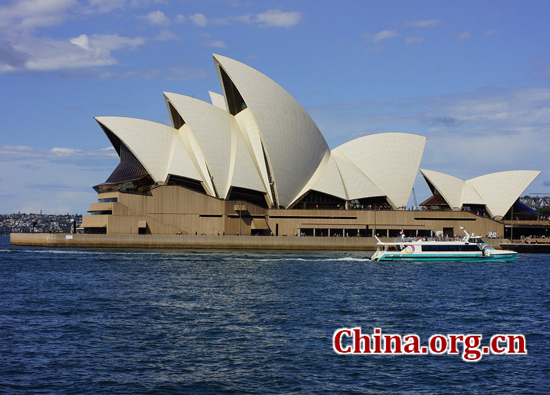?Australia's pivotal strategic role in Indo-Pacific order
- By Sumantra Maitra
 0 Comment(s)
0 Comment(s) Print
Print E-mail China.org.cn, June 25, 2018
E-mail China.org.cn, June 25, 2018

The recent Lowy institute poll shows what has been quite clear in strategic circles in Asia-Pacific, that the most relevant and pivotal country in the entire region is Australia. Australia is a country which has a mixed character and will be influential in the balance of power in the region in the years to come.
The conventional wisdom goes like this. Australia is the staunchest American ally who has taken part in all American wars since 1945. New realities are however changing that perception. Australians are now ambivalent about the coming great power rivalry between China and the U.S., and the Australian strategic community as well as the general public realize that the time to choose might be near, and Australia will have an enormous impact on the balance in the region.
The poll, conducted by the Lowy institute reveals some startling, and some not so startling facts. First of all, the trust in the major alliance partner in the United States has fallen significantly, to its lowest level. This is partially attributed to the rise of Donald Trump but more to the overall idea that United States is either incapable or unwilling to continue taking on the security burden and is increasingly turning isolationist.
On the other hand, despite conventional wisdom, Australians don't really care about Chinese influence in the political process but are more interested in Chinese investment. Jobs and economy is what matters more, and there's a concern in Australia that too much foreign investment would hamper Australia's security position in the region. While there's a need for foreign investment, Aussies are skeptical of foreign influence.
When asked which global power Australians trust the most, the U.K. came on top with 90 percent, which was unsurprising, given the historical and familial ties. But second came India, with 59 percent, and then the U.S. and China with 55 percent and 52 percent respectively. On one hand it highlights Australian skepticism with all major powers, and on the other hand, it suggests that Australians are overall undecided, and open to explore new alignments.
This is significant. As the report suggests, "But equally consistent is a conviction on the part of most Australians that China represents more of an opportunity than a threat, and that Australia should be able to maintain good relationships with China and the United States at the same time."
Finally, on one-point Australians are similar to the rest of the first world is that hardline anti-immigration sentiment is rising there as well. The broad anti-migration ideas that are sweeping through Europe and continental America has found resonance. Australians believe that the nation state is important, borders are paramount, and that they need to be guarded from external infiltration.
This opens up a range of future scenarios. How would Australia react in the future, if there's a proxy war or conflict in Asia? Which side would Australians take? Would Australia be pushed towards China, or the U.S., if the other power seems menacing? These are important questions to be asked by policy makers, and these are long term trends which do not end with Trump.
For example, Australia is awash with news about a growing rivalry and Chinese influence which is played by the media constantly. The Australian PM, for example, was asked about the reality, and seemed to differ. PM Turnbull said that it was the media which present a lot more sensationalist and negative portrayals, than reality, stating that there are 1.2 million Australians who are of Chinese descent who have strong business ties.
Unipolarity is gone, and that is an accepted fact. Research proves it. While there's not going to be a global hegemony anytime soon, the new world order is taking its shape, and that has started in Asia. Australia, as we say in international relations, is hedging its bets. It will be interesting to observe, which side the chips fall.
Sumantra Maitra is a columnist with China.org.cn. For more information please visit:
http://www.ccgp-fushun.com/opinion/SumantraMaitra.htm
Opinion articles reflect the views of their authors only, not necessarily those of China.org.cn.





